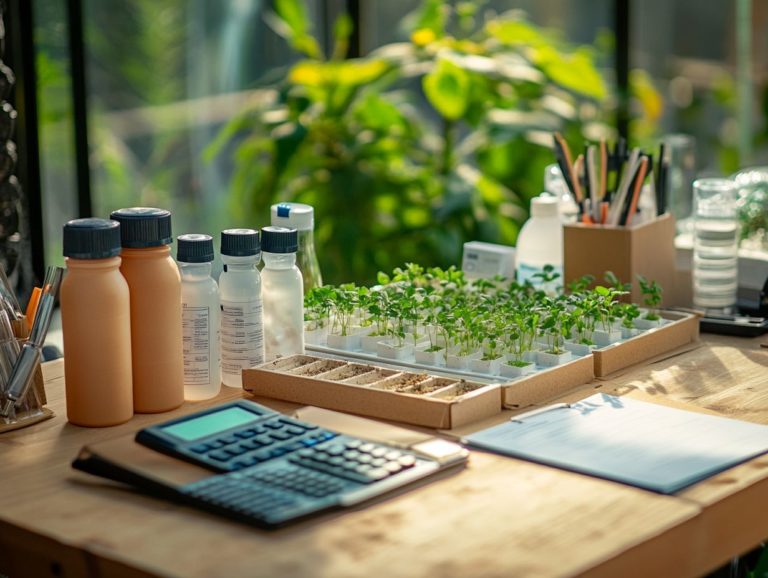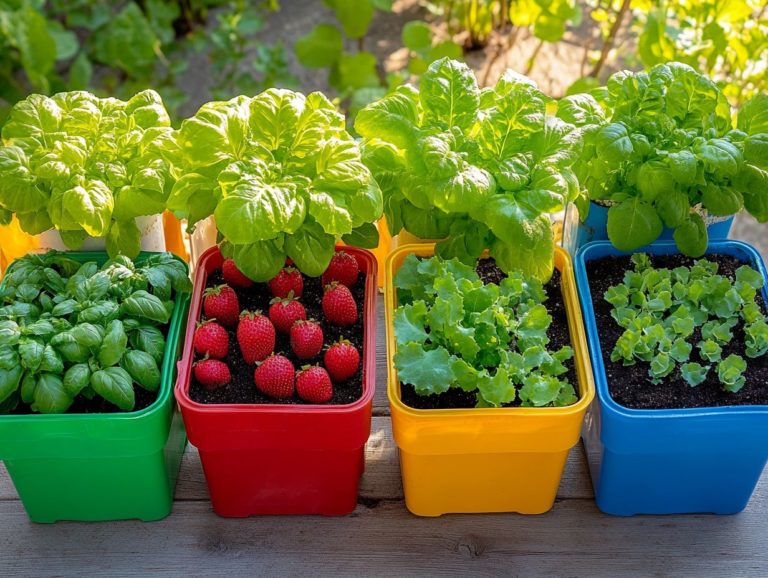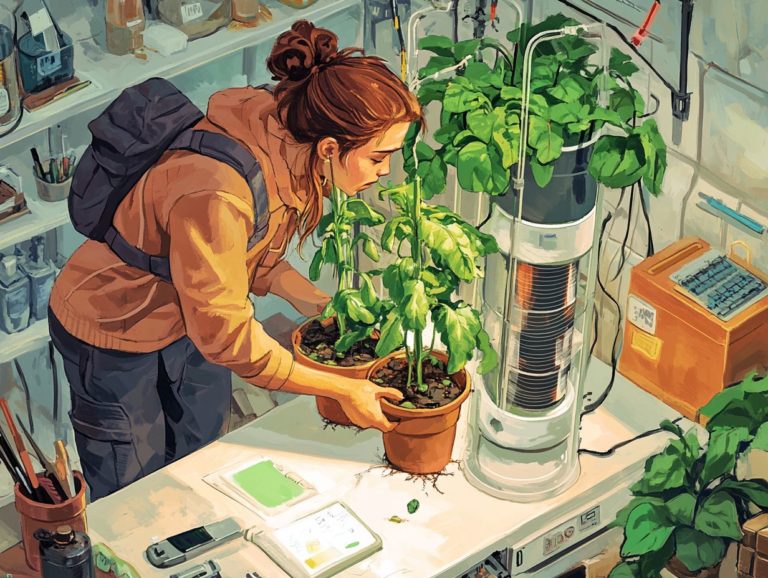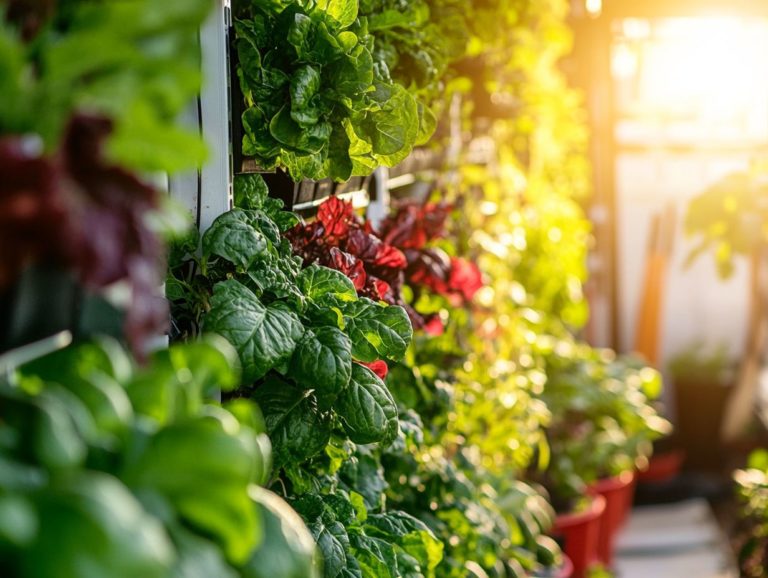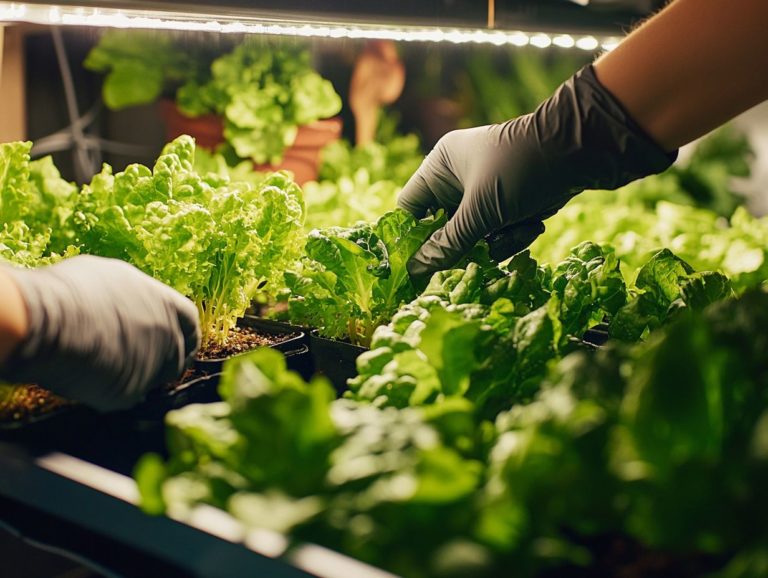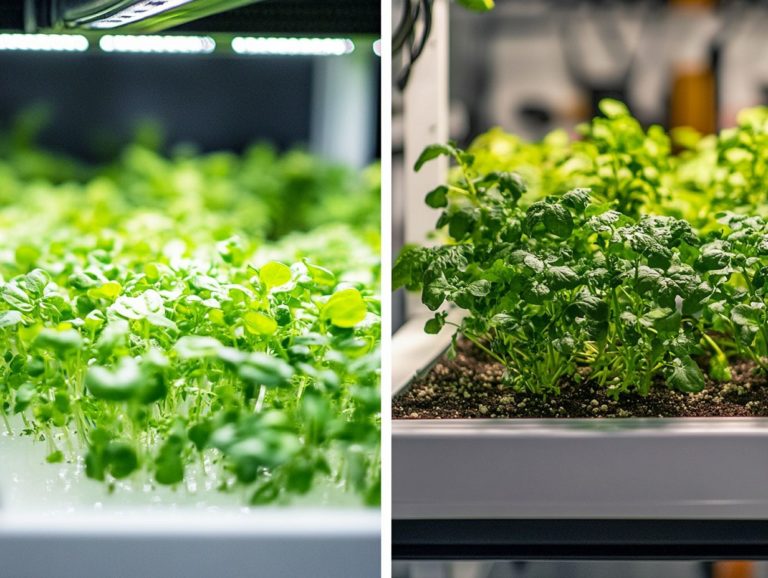What are the Common Hydroponic Gardening Myths?
Hydroponic gardening is an exciting and efficient way to grow plants without soil. This innovative technique opens up new possibilities for urban gardening.
Unfortunately, many misconceptions can create confusion and hesitation for those interested in hydroponics.
Common concerns about nutritional value and the complexity of setup can be misleading.
Let s bust five common myths about hydroponic gardening that might be holding you back while showcasing the many benefits of this alternative gardening method.
Whether you’re a seasoned gardener eager to learn more or a curious beginner ready to explore, you’ll find valuable insights to kickstart your hydroponic gardening journey with helpful hydroponic solutions.
Contents
- Key Takeaways:
- Common Myths About Hydroponic Gardening
- Busting the Myths: The Truth About Hydroponic Gardening
- Benefits of Hydroponic Gardening
- Getting Started with Hydroponic Gardening
- Frequently Asked Questions
- What are the Common Hydroponic Gardening Myths?
- Do plants grown in hydroponic systems lack nutrients?
- Is hydroponic gardening only suitable for small-scale operations?
- Do hydroponically grown plants taste different?
- Is hydroponic gardening expensive?
- Can hydroponic gardening only be done indoors?
- Is hydroponic gardening only for experienced gardeners?
Key Takeaways:
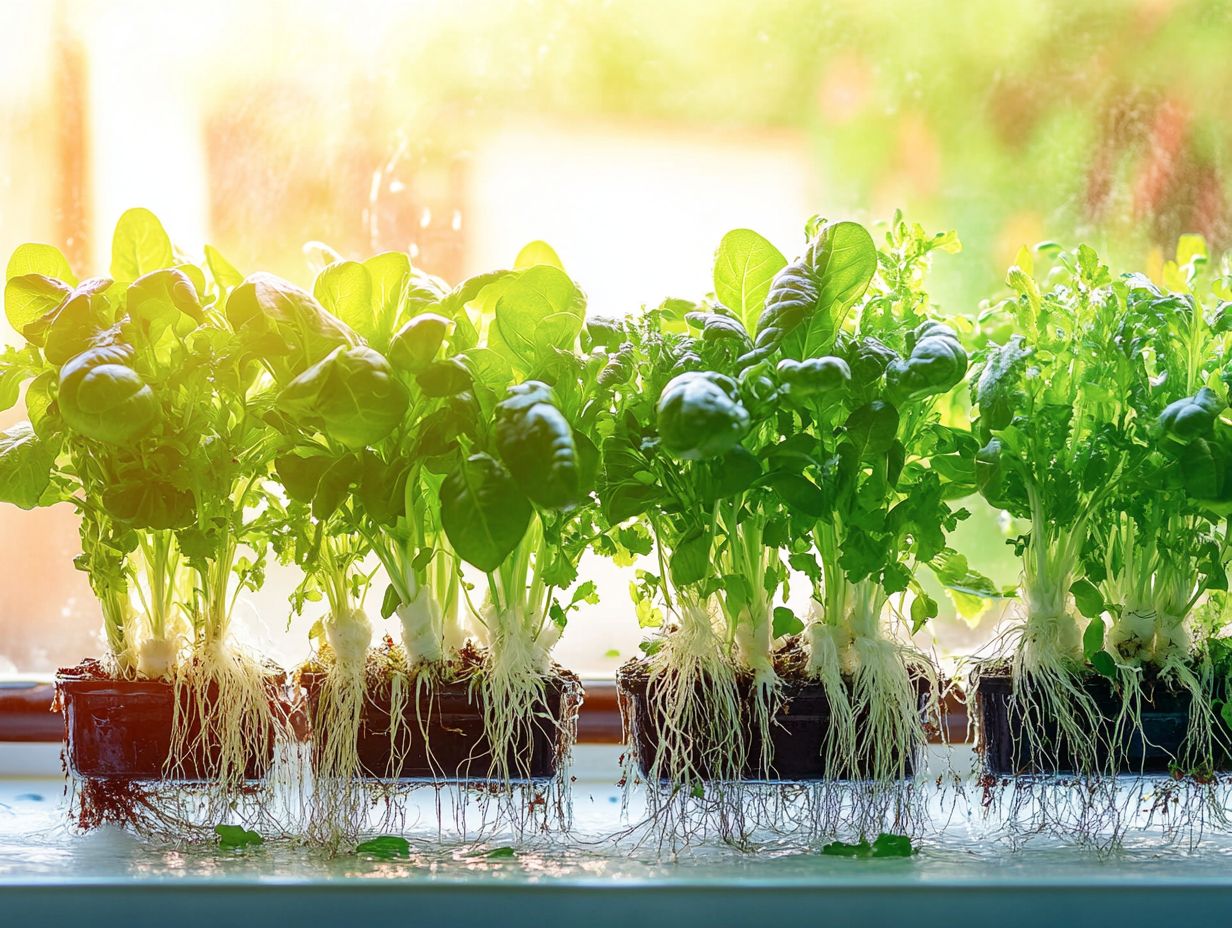
- Hydroponic gardening allows you to grow plants without soil, but many misconceptions surround it.
- Hydroponic plants can be just as nutritious as soil-grown plants, and hydroponic gardening can be affordable and straightforward.
- Anyone, including beginners, can start a thriving hydroponic garden with budget-friendly hydroponic kits and techniques.
What is Hydroponic Gardening?
Hydroponic gardening is your ticket to a soil-free growing revolution. It uses liquid food for plants to cultivate crops in a controlled environment. Unlike traditional soil-based methods, hydroponics offers a variety of innovative systems, including vertical farming and aeroponics.
This approach not only boosts crop yields but also enhances resource efficiency.
As urban gardening grows, hydroponics stands out by maximizing space and minimizing environmental impact. With hydroponically grown vegetables and fruits, you can enjoy the highest quality produce.
In hydroponic systems, plants receive essential nutrients directly through the water, promoting accelerated growth and superior nutrient absorption. You can choose from various systems, such as nutrient-film technique (NFT) and deep water culture (DWC), to suit different crops.
These methods promote water conservation and reduce the need for pesticides and fertilizers, championing sustainable agriculture and supporting chemical-free farms.
Produce grown hydroponically often has enhanced nutritional value, as the controlled environment amplifies flavors and maintains freshness.
By embracing this innovative approach, you can create lush green spaces and actively contribute to food security in densely populated areas.
Common Myths About Hydroponic Gardening
Despite the rise in popularity, several myths may cloud your perception of hydroponic gardening. You might believe that hydroponic methods are for experts only or require significant knowledge and investment.
The truth is different; there are affordable hydroponic solutions and beginner-friendly kits available. This makes it easy for anyone to jump into this space-efficient form of gardening while enjoying the many advantages of hydroponic farming.
Start your hydroponic journey today and join the growing community of hydroponic gardeners!
Myth #1: Hydroponic Plants are Less Nutritious
There’s a prevalent myth that hydroponic vegetables lack the nutritional punch of their soil-grown counterparts, but this couldn’t be further from the truth! Hydroponically grown produce often surpasses traditional varieties in vitamins and minerals, boasting essential nutrients like vitamin E and vitamin C. This is thanks to carefully designed nutrient mixes that cater to the specific growth needs of the plants, ensuring robust growth.
Research supports this, revealing that controlled environments enable optimal growing conditions, enhancing nutrient absorption and supporting the health of hydroponic systems. A study published in the Journal of Agricultural and Food Chemistry found that hydroponic lettuce had significantly higher levels of antioxidants compared to its field-grown peers, contributing to a superior nutritional profile. Since water and nutrients are delivered directly to the roots, plants can devote more energy to growth and nutrient production.
Hydroponic practices reduce exposure to pests and diseases, leading to healthier plants that thrive with fewer resources. This not only fosters robust growth but also elevates their nutritional profile, making hydroponic vegetables a worthy addition to any home gardening diet.
Myth #2: Hydroponic Gardening is Expensive
Many people might think that hydroponic gardening is a luxury reserved for the affluent, but the truth is that it can be surprisingly budget-friendly! With a range of affordable hydroponic solutions, including hydroponic kits, you can start your gardening adventure today without emptying your wallet. Beginner-friendly hydroponic kits are crafted to be user-centric, allowing anyone to cultivate their own hydroponic garden with ease.
These kits typically come with all the essentials nutrient solutions, grow lights, and seed pods at a fraction of what traditional gardening setups would cost. By ditching the soil in favor of hydroponic gardening, you significantly cut down on water usage, leading to lower utility bills. Plus, as your plants flourish faster and yield more, you ll enjoy substantial savings on groceries over time!
The beauty of compact indoor hydroponic systems means you can garden year-round, eliminating the need to buy pricey out-of-season produce. Embracing hydroponic gardening not only fosters sustainability but also stands as a wise financial decision.
Myth #3: Hydroponic Gardening is Complicated
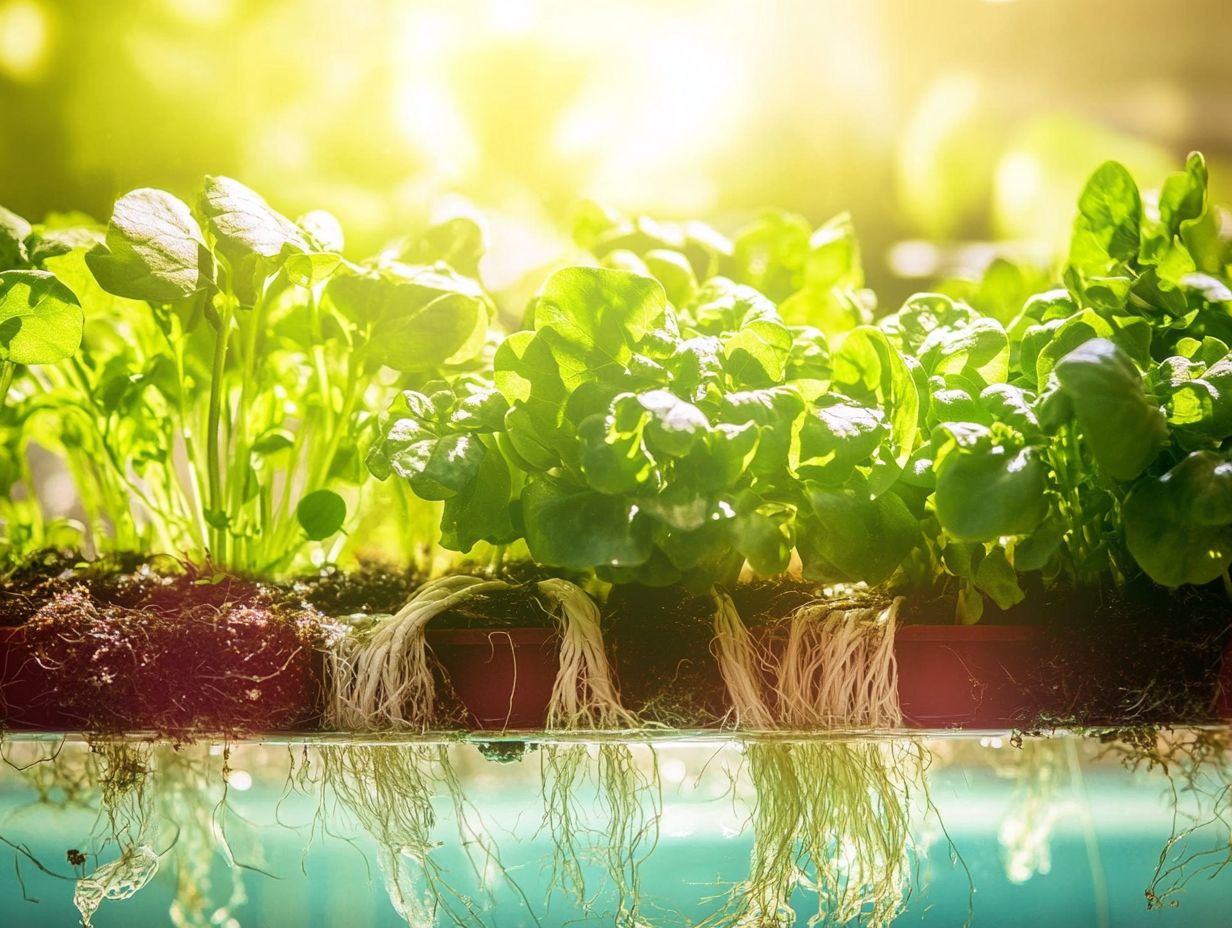
Another widespread myth is that hydroponic gardening is far too complicated, requiring a degree in rocket science to navigate. In reality, modern hydroponic systems have transformed into user-friendly technologies, making these methods accessible even for beginners! Many hydroponic kits come equipped with detailed instructions, streamlining both the setup and maintenance processes.
These innovative hydroponic systems often feature pre-assembled components, allowing you to jump into gardening without the daunting complexity of traditional designs. For example, nutrient film technique setups and deep water culture systems are designed with intuitive interfaces that effectively manage nutrient flow and oxygenation, ensuring optimal plant health. Many kits also include timers and monitoring tools, taking the guesswork out of plant care. However, it’s important to consider the disadvantages of hydroponic gardening before diving in.
As a result, you can focus on enjoying the growth process, cultivating a variety of plants like herbs and leafy greens through hydroponic methods, all without the steep learning curve that used to come with hydroponics!
Ready to dive into hydroponic gardening? Start exploring your options today!
Myth #4: Hydroponic Plants are Prone to Diseases
There’s a prevalent misconception that hydroponic plants are more vulnerable to diseases than their traditionally grown counterparts. However, the controlled environment of hydroponic gardening offers better ways to prevent and treat diseases. You can monitor and regulate conditions such as humidity, light, and nutrient solutions, leading to enhanced plant health and resilience.
By maintaining optimal temperature and airflow levels, hydroponic systems significantly reduce the risks associated with fungal and bacterial infections. This protects your hydroponic crops. Adopting practices like regular cleaning and sterilization of equipment, along with choosing disease-resistant plant varieties, can greatly diminish the likelihood of outbreaks in your hydroponic garden.
Integrating pest management strategies not only bolsters disease control but also nurtures a balanced ecosystem within your hydroponic systems. With advances in technology at your fingertips, you can access real-time data to swiftly identify any anomalies and enable timely interventions.
These proactive measures ultimately promote vigorous plant growth, positioning hydroponics as not just an efficient method, but a safer alternative to conventional gardening practices.
Myth #5: Hydroponic Gardening is Only for Experienced Gardeners
The notion that hydroponic gardening is solely for seasoned experts overlooks the remarkable accessibility of this innovative growing method. With the rise of affordable hydroponic kits, exciting opportunities arise for new growers! You ll find a wealth of resources at your fingertips, from educational programs to beginner-friendly hydroponic kits, all designed to guide you as you embark on your hydroponic gardening journey.
In fact, don t miss out on a treasure trove of online tutorials that offer step-by-step guidance on everything from setting up your system to maintaining the perfect nutrient balance for your hydroponic solutions. Local community programs often host workshops and meetups focusing on hydroponics, allowing you to connect with seasoned enthusiasts eager to share invaluable tips and insights.
Starting small with a manageable indoor hydroponic kit is a smart move. This enables you to experiment and build confidence without feeling overwhelmed. This gradual progression transforms the process into an enjoyable experience while reinforcing your foundational knowledge of hydroponic techniques, making it easier to dive into more complex systems down the line.
Busting the Myths: The Truth About Hydroponic Gardening
Busting the myths surrounding hydroponic gardening is crucial for cultivating a deeper appreciation of its true capabilities and advantages. By distinguishing fact from fiction, you will understand the myriad benefits of hydroponics, such as its sustainability, efficiency, and innovative growing channels.
These qualities make it an appealing choice for both urban gardeners and farming enthusiasts who seek innovative and effective growing solutions.
Debunking the Misconceptions
Debunking myths about hydroponic gardening relies on facts and research that highlight its viability and effectiveness. Numerous studies show that hydroponic systems can yield higher crop outputs, promote better plant health, and enhance sustainability compared to traditional soil-based methods.
For instance, research from the University of Arizona found that hydroponic tomatoes produced up to 30% more than those grown in soil, demonstrating hydroponics’ efficiency in maximizing space and resources.
A detailed analysis by the USDA revealed that leafy greens grown hydroponically had less pesticide residue and shorter growth cycles, benefiting both consumers and producers.
These findings show that hydroponics can boost productivity and emphasize its environmentally friendly nature, encouraging farmers to adopt more sustainable practices. This shift opens exciting opportunities for both home gardeners and commercial growers, paving the way for a new era in food production.
Benefits of Hydroponic Gardening
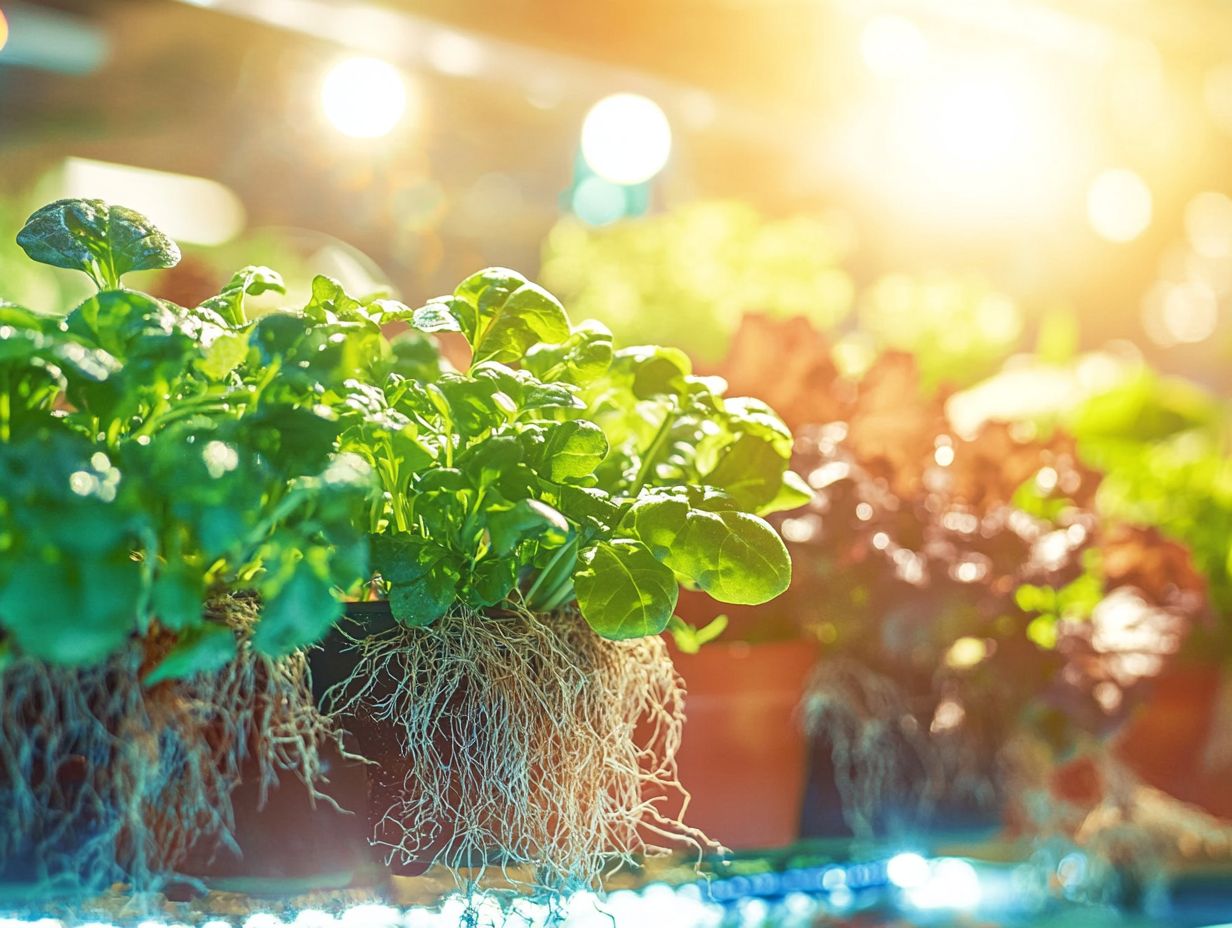
Hydroponic gardening offers exciting benefits you won’t want to miss! It stands out from traditional soil-based methods, making it an excellent choice for discerning gardeners.
Among these advantages are advanced water conservation, impressive crop yields, and a notably reduced environmental impact. These factors highlight the appeal of sustainable agriculture, especially in urban settings.
Advantages over Traditional Gardening
The advantages of hydroponic gardening over traditional methods are impressive. They offer significant improvements in crop yields and resource management.
By embracing hydroponic systems, you can grow plants in a controlled environment, allowing for faster and more efficient growth compared to conventional soil gardening. This makes hydroponics ideal for urban gardening initiatives.
Unlike traditional methods that rely heavily on soil, hydroponic systems can cut water usage by up to 90%, providing a sustainable alternative, especially in areas facing water scarcity.
The precise delivery of nutrients ensures your plants get exactly what they need during critical growth stages, leading to higher nutrient efficiency and healthier crops.
This careful control allows for year-round cultivation, letting you produce fresh, organic produce even in off-seasons, contributing significantly to food security. Enhanced practices minimize waste and lower the environmental footprint associated with conventional gardening, making hydroponics a smart choice for you and the planet.
Getting Started with Hydroponic Gardening
Starting your hydroponic garden is exciting! You’ll discover endless possibilities for growing delicious plants at home. With a range of user-friendly hydroponic kits and essential tools available, you can effortlessly dive into this innovative gardening method and enjoy the delightful rewards of fresh, homegrown produce.
Essential Tools and Techniques
To thrive in hydroponic gardening, you ll need a suite of essential tools and techniques that foster optimal plant growth.
This includes selecting the right hydroponic systems, formulating nutrient solutions, and employing monitoring equipment to maintain a stable environment for your plants.
Efficient pumps are essential; they ensure the nutrient-rich water circulates effectively, so each plant receives its fair share of nourishment.
A high-quality reservoir is equally critical, as it stores the nutrient solution and allows you to manage water levels with ease.
Choosing the appropriate lighting systems whether LED or fluorescent is key to mimicking natural sunlight. This promotes photosynthesis even in a controlled indoor setting.
By incorporating techniques like adjusting the acidity or alkalinity of the water and regular nutrient adjustments, these tools can dramatically boost your plants’ growth rates, making your hydroponic journey thrilling!
Frequently Asked Questions
What are the Common Hydroponic Gardening Myths?
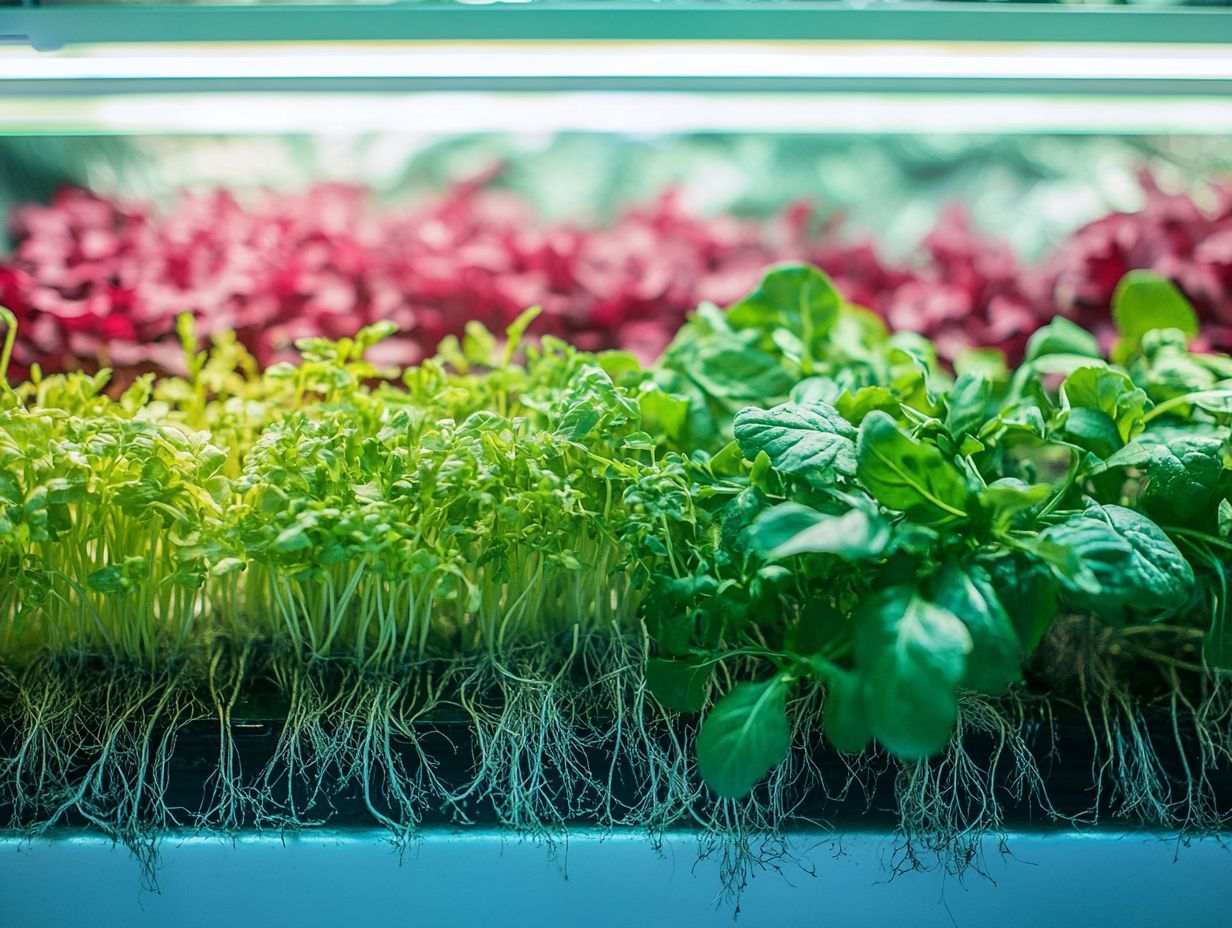
There are many myths surrounding hydroponic gardening. Here are some of the most common ones debunked:
Do plants grown in hydroponic systems lack nutrients?
False. Hydroponic systems allow precise control of nutrient levels, ensuring plants receive the necessary nutrients for healthy growth.
Is hydroponic gardening only suitable for small-scale operations?
No, hydroponic gardening can be scaled to fit any size, from small home gardens to large commercial operations.
Do hydroponically grown plants taste different?
Not necessarily. Properly grown hydroponic plants can have the same taste and nutritional value as traditionally grown plants.
Is hydroponic gardening expensive?
Setting up a hydroponic system can cost more at first, but it pays off over time!
Can hydroponic gardening only be done indoors?
No, hydroponic gardening can also be done outdoors, as long as the proper conditions are met for the chosen plants.
Is hydroponic gardening only for experienced gardeners?
Not at all. Hydroponic gardening can be learned by anyone, regardless of their gardening experience, with the right resources and guidance.

